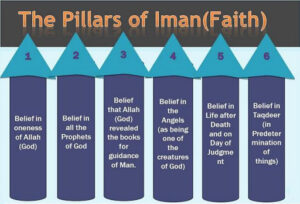
Islam helps us develop a close relationship with Allah by first telling us what to believe in (the 6 Articles of Faith) and then explaining how to implement these beliefs in our lives (the 5 Pillars of Islam). Muslims believe in the following six Articles of Faith.
1. To believe in the Oneness of God
God is One. He is the Supreme and Eternal, the Creator and Provider, the Merciful and Compassionate. God has no father or mother and no son or daughter; He has never fathered anyone nor was He fathered. God has no equal. He is the God of all humankind, not of a special tribe, race, or group of people. He is the God of people of all races and colours, and of believers and unbelievers alike. God is Mighty and Supreme, yet is very near to the pious and thoughtful believers. God asks us to know Him, to love Him, and to follow His law for our own benefit and salvation.
2. To believe in the Angels
Belief in the existence of angels is one of the fundamental articles of faith in Islam. Muslims believe that angels were created by God from light. Angels carry out God’s commandments in nature and the universe. What we usually call the “forces of nature” become active because of the presence of angels behind them, working at the command of God. Jibreel (Gabriel) Is the biggest and mightiest angel. He sent the first words of the Quran to our Prophet Muhammad (saws).
3. To believe in the Books of Allah
Muslims believe that Allah revealed His laws in stages to mankind through His prophets, and therefore accept the Torah of Moses (peace be upon them), the Psalms of David (pbuh) and the Gospel of Jesus (pbuh) as Holy books, as well as the sacred scriptures of all other messengers of Allah. However, Muslims believe that all such revelations were limited to a specific time and people and are not preserved in their original purity, but subject to distortions. All the Holy Scriptures culminated in, and were perfected in, the Holy Quran (just as all religions were perfected in Islam).
4. To believe in all the Prophets
The Prophets of Allah are chosen from among human beings. They set the best examples of moral and spiritual conduct. They lead mankind to Allah by conveying the Divine revelation and also by their own example of purity and righteousness. Muhammad (pbuh) is the chief of the Prophets, and he brought perfect guidance for us from Allah. He came as a blessing for mankind. Allah has told us reapetedly to worship in all the prophets.
5. To believe in the Day of Judgement
One of the most emphasized beliefs in the Holy Quran is the belief in the Day of Judgment. Islam teaches that physical death is not the end of man’s existence, rather it is the door to a higher form of life which can bring one closer to Allah, depending on one’s deeds in this life. According to the Holy Quran, on the Day of Judgment this entire universe will come to an end, and the dead will be resurrected. Their deeds will be judged and they will be rewarded accordingly. Those with good records will merit Heaven, while those with bad deeds will be punished in Hell. This belief provides a powerful accountability tool in this life as well, meaning that ultimately the accountability for our actions and deeds is with Allah, the Almighty in the hereafter.
6. To believe in the Divine Decree
Divine Decree means the Will of Allah. Muslims believe that Divine Decree controls the eventual outcome of all actions in this universe. It is the law or measure of a thing with regard to its growth and development. In the Holy Quran, the term is explained as a universal law of Allah which is working through the whole of creation, extending throughout the universe. Within the boundaries of Divine Decree, man is given free will.
Comments are closed.